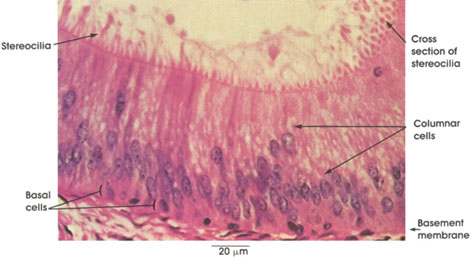

Epididymal duct
Ronald A. Bergman, Ph.D., Adel K. Afifi, M.D., Paul M. Heidger,
Jr., Ph.D.
Peer Review Status: Externally Peer Reviewed

Rhesus monkey, Helly's fluid, H. & E., 612 x.
The epididymal duct is lined by a pseudostratified columnar epithelium containing two types of cells: tall columnar cells bearing so-called stereocilia and rounded basal cells. The cells forming a pseudostratified epithelium deceptively appear to be stratified in two or more layers. The cells actually vary in height, but all are in contact with the basement membrane.
Columnar cells: Tall cells bearing stereocilia. These are non-motile processes of the columnar cells projecting into the lumen. Although they are called cilia, electron micrographs show that they lack the structural characteristics of cilia, and they resemble greatly elongated microvilli. In this figure, they are seen in both cross and longitudinal section. Nuclei of columnar cells are elongated and lie at different levels.
Basal cells: Rounded or triangular cells, lying against the basement membrane, form a discontinous layer around the duct.
Next Page | Previous Page | Section Top | Title Page
Please send us comments by filling out our Comment Form.
All contents copyright © 1995-2025 the Author(s) and Michael P. D'Alessandro, M.D. All rights reserved.
"Anatomy Atlases", the Anatomy Atlases logo, and "A digital library of anatomy information" are all Trademarks of Michael P. D'Alessandro, M.D.
Anatomy Atlases is funded in whole by Michael P. D'Alessandro, M.D. Advertising is not accepted.
Your personal information remains confidential and is not sold, leased, or given to any third party be they reliable or not.
The information contained in Anatomy Atlases is not a substitute for the medical care and advice of your physician. There may be variations in treatment that your physician may recommend based on individual facts and circumstances.
URL: http://www.anatomyatlases.org/